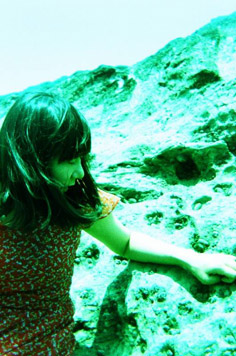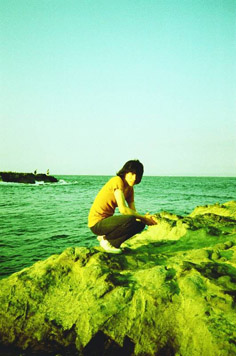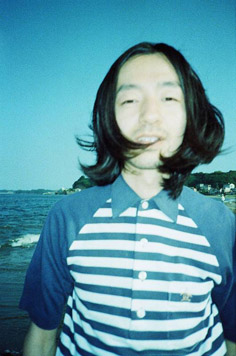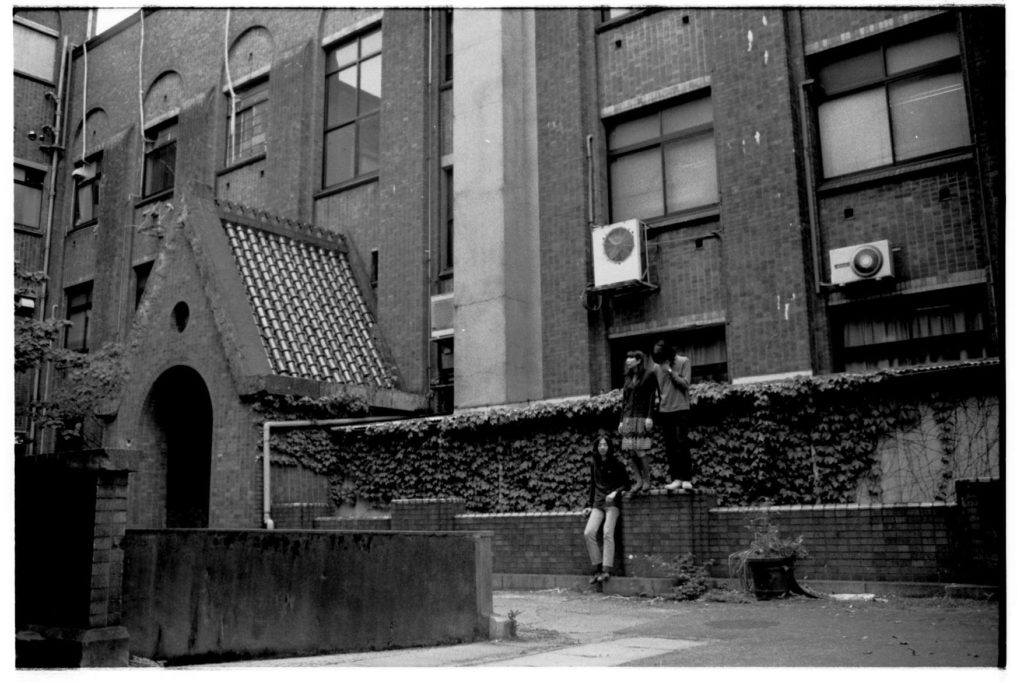Hachigatsu no Shijou, a limited edition summer-themed album, was released by Lamp in mid-2010. Below you’ll find three interviews all pertaining to this great release — one of my personal favorites from the group (though who am I kidding: they’re all great.)
Original interview & text: mFound (original interview)
English translation: Henkka
Lamp online: website, label, blog, Facebook, Twitter, Spotify, YouTube, SoundCloud, Instagram
You can buy Lamp’s music directly from the band, both physically and digitally, on Bandcamp.

Lamp released their latest limited edition EP, Hachigatsu no Shijou, on August 4th. Always dedicated to producing uncompromising sounds and showing us the world of Lamp in all its forms — an obsession perhaps a result of the band hailing from the field of independent music. We caught up with the group to talk to them about their music at the beginning of spring, back when it was still too chilly outside to put away the outer jackets.
— You’ve released five full-length albums thus far, and I understand you’re now busy recording your sixth?
Taiyo Someya: Yes. Well, Zankou was more just a compilation than an actual album, so it’s more like four albums and then some. So for us it feels like we’re now recording our fifth album.
— And how are the recordings going?
Someya: Well, it certainly feels like our best material yet, but then again, I may not have the most objective opinion on this matter. (laughs) In any case, we just go on about recording and try not to overthink things.
— Are you producing this new album by yourselves?
Someya: Yes. We’ve actually self-produced all our albums, beginning with the first one.
— Have you ever felt like you’d like to have someone produce for you — kind of like your own George Martin (The Beatles)?
Someya: Not so far, no.
— Is that because you feel that you’re already getting the sound you want on your own?
Someya: As of late it definitely does feel that way, yes. Who knows, some day we might reach a limit as to what we can do ourselves and we might feel like having a producer, but right now we prefer our current approach. I don’t want to sound big-headed, but we have a clear vision of what we want to create, and if whoever working with us doesn’t share that vision with us, collaborating would be difficult. And even if they did, it might still lead to fights and differences in opinion. I mean, even me and Nagai have clashing opinions and we’ve been working together since the very beginning. If you were to bring in someone else who’d grown up in a different musical environment… no matter how great of a producer that person was, I think we might have a hard time working with them. Sure, we probably could do it if there was proper communication from the beginning and all that, but we just don’t want to compromise on any part of what we do, so I think it’d be very difficult.
— The songwriting is all done by Someya and Nagai, right?
Yusuke Nagai: Right. The band originally started as something where me and Kaori would just sing simple vocal melodies in different octaves on top of Someya’s bossa nova-ish songs. Traces of that could still be heard on our first album, but with each successive release, I started writing more songs as well. It got a bit more singer-songwriter-ish overall in that for the songs I write, it’s mostly just me singing them. Those make up for about a third of the songs. The majority of songs are composed by Someya, with either me and Kaori singing them together — which was the original style — or otherwise just Kaori singing alone. Lamp’s music mostly consists of those three patterns.
— And the arrangement is done by the main songwriter?
Nagai: Yes, for the most part the person writing the song will have a rough outline of it in their head, and the rest is all made up on the fly. It’s all pretty spontaneous to be honest. (laughs)
— When you’re writing, do the songs already have a “band sound” as you’re starting to flesh them out, or do you have to specifically think about writing those types of songs, ones that would fit Lamp?
Someya: I guess it’d be the former.
Nagai: The way it used to be is that we’d initially have an image of how we wanted the song to sound, and we’d get really absorbed in trying to work towards that. But in the end, none of them ever really ended up sounding quite like we’d imagined them.
Someya: The process has gradually gotten more “hands-on.” We’re starting to get a feel for the best way to arrange the drums and bass to first make up a strong foundation for the songs…
— Are you laughing, Nagai?
Nagai: (laughs) I still have a long way to go myself, but I was just thinking about how great Someya has gotten at the technical stuff compared to before. I mean, in the beginning he was basically like “to hell with rhythm.” He didn’t care about that kind of thing at all. But lately he’s all “if you do it like this, it really gives the song some proper groove!” and stuff…
Someya: True, I’d noticed that about myself. I didn’t realize you had as well. (laughs)
— Please tell us about the band’s formation.
Someya: Me and Nagai attended the same high school and university, and we started working on music together through that connection. But I couldn’t envision us doing anything significant with just us two, so I got an old friend from high school to introduce us to Sakakibara. Ever since then it’s just been us three with no additions or reductions. (laughs)
Kaori Sakakibara: No one in my circles was playing original material those days, so meeting you two was a pleasant surprise.
Someya: The thing all three of us had in common was that we all liked soft rock, bossa nova, and 60’s music. Then we started branching out into other genres, too, like 70’s soul, AOR, and other Brazilian music besides bossa nova.
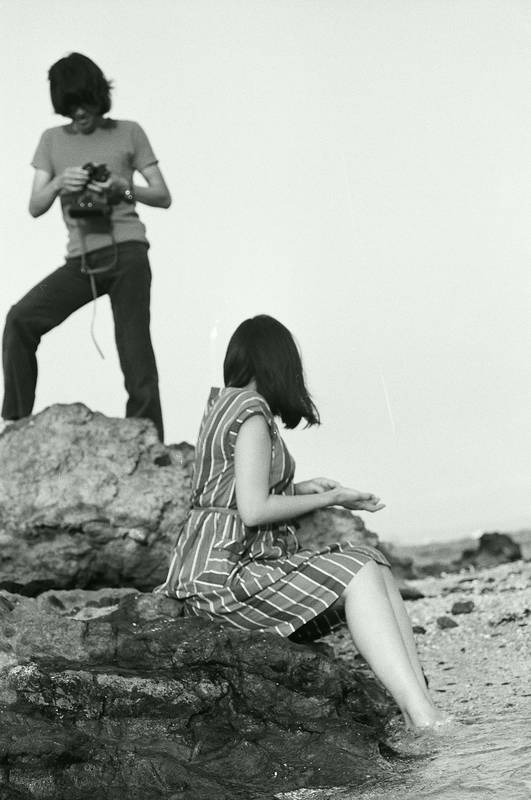
— I think the artwork of your CD’s and your video clips manage to capture quite perfectly the feel of your music.
Someya: Yeah. That’s a team effort by four people: the three of us in Lamp plus a high school friend of mine.
Nagai: Our first album was pretty much just bossa nova and I guess people had this “stylish” image of us. But we’re actually really not the café-going type at all. (laughs) On the contrary, we much prefer the sceneries of more rural Japan over the big cities. So in the past some people didn’t think our music and the (artwork) visuals were a great match — that’s because they figured what we were doing was “café music,” and I just thought to myself “that’s not it at all…” In that sense, it feels like our recent material has become a better match for the visual aspects.
Sakakibara: That brings back memories, us being called café music… (laughs) That was right around the time when that type of music was popular.
— Have you ever thought about joining a major label?
Someya: Honestly, right now I think that as long as we get to keep doing what we like, I don’t feel a strong need for us to be on a major label. That might be easier said than done, though: it feels like the more we do what we want to do, the further we’re drifting from what’s popular these days. But we certainly hope we’ll be able to keep on going. In the past it felt like indie bands had a little more power and freedom to do what they liked, and there were lots of labels that gave them those opportunities. But these days it feels like most bands tend to be more semi-major-oriented, or just making music for no one’s enjoyment but their own. We have a MySpace page, for example, but when seemingly everyone has a page on there now, it doesn’t feel like any band could explode and just become huge through that service anymore. Well, I don’t know — maybe it’s just that our band doesn’t have that kind of explosive power. (laughs)
Nagai: When we made our MySpace page, I thought “okay, cool, with this we’ll have people from all over the world listening to our music!” But I now realize the chances of that actually happening with a band of our scale are quite slim.
— Have you ever thought about trying to attract more overseas listeners by, for example, writing English lyrics?
Someya: No. Interestingly, if we look at our MySpace statistics for instance, most people accessing it are not from Japan but from America — by a wide margin. And there are listeners from many other countries, too. But that alone probably isn’t enough for us to further the scope of our activities overseas. It really isn’t feasible without a label from that specific country backing you. Otherwise the opportunities will present themselves only through contacts between the band and private individuals, though that’s actually pretty nice, too.
— You recently performed live in South Korea, right?
Someya: Right, and that actually ties into what I was just saying. This South Korean label called Pastel Music liked us and they wanted to release our first three albums there, so we now have listeners over there as well. That’s what it took for us to be able to go there.
Sakakibara: This was our third time playing there. It seems that music downloads and live shows are quite prevalent in South Korea right now. Even our concerts have people excitedly cheering to an extent that I just can’t imagine happening in Japan. (laughs)
— There’s this real sense of warmth in Lamp’s music thanks to the live instrumentation. Are you picky about only wanting to use real instruments?
Someya: All the music we like was recorded from the 60’s through to the 80’s, so we honestly don’t even know modern music all that well. (laughs) Doing something you don’t know would be difficult, so maybe it’s only inevitable that there’s that feeling of live instrumentation. That’s what we like ourselves.
— What is your upcoming CD going to be like?
Someya: I think it’s going to be a logical continuation of all that we’ve been doing up until now. We’re always thinking about evolving, but in saying that, it’s not like we specifically try to challenge ourselves to do something new with each release. We just allow ourselves to evolve naturally.
This second interview is from BRIDGE INC.
Original interview & text: Masaru Yokota (archive.org copy of original interview)
English translation: Henkka
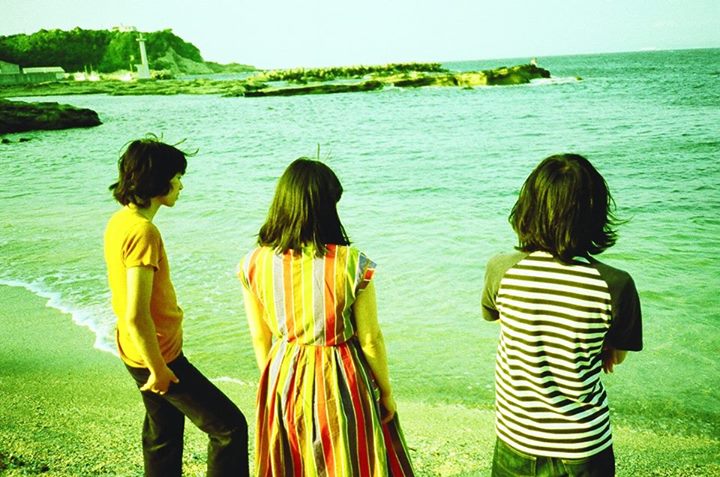
— You released this EP out of the blue as you were recording your upcoming full-length album. What led you to this decision?
Someya: We’d been busy working on a total of 15 songs for our fifth album since April last year. At the end of May earlier this year I happened to be listening to a working version of “Hachigatsu no Shijou” (the fifth track on the new release) at a certain rural train station, and I just thought to myself how nice it’d be if we were to release it in the summer. The more I thought about it, the more convinced I became: we had to release it in the summer, so I talked about it to Sakuma from Motel Bleu and the other two, Nagai and Sakikabara. There’s no stopping me when I get that excited about an idea, and so Sakuma said we could release it on a five-song EP, which is exactly what we ended up doing.
— Maybe it’s because you had a running theme on this release — “summer” — but I thought both the lyrics and melodies were more straightforward than on your past material. I felt like I “got it” faster than your previous albums. Was this something you did intentionally?
Sakakibara: Well, we already had all the music and lyrics written by the time this idea came about near the end of May, and we’d already recorded 60% or 70% of everything. Besides, I think our writing methods were the same as they’ve always been. We just selected songs that fit the feel of “Hachigatsu no Shijou” and released the CD in the summer, so the theme of it is quite apparent. I believe it may thus sound like a pretty coherent release of course, and I do think listeners may find it easier to understand than our previous releases.
Nagai: I don’t think we specifically wrote any of the songs on this release to be more straightforward. We worked on them the same way as always: through repeated trial and error, gradually getting closer to how we imagined the songs should sound. But, like you said, the confined theme of summer might make it easier to get as a whole. Maybe “Aoi Kaigansen Kara” might’ve been relatively straightforward?
Someya: Yeah, I’m guessing you felt that way about “Aoi Kaigansen Kara” and “Hirusagari no Jouji” in particular — both songs written by me. Music is made up of lots of different components, and for me the way it works with songwriting is that I first get into this phase where I tend to mostly write the very structurally elaborate compositions, and there are some types of music I can’t yet express at that stage. It’s only later that I get into another phase where I start wanting to write songs with simpler structures or configurations, ones where I focus on the atmosphere of the song more than anything else. To me it feels like my songs on this release are the kind I wrote strictly in that later stage of my songwriting process, and I think this may be why you thought the songs sounded straightforward.
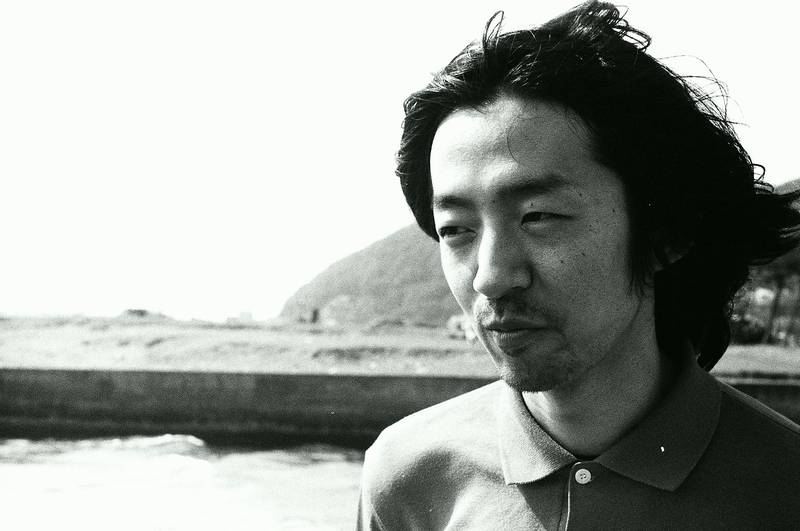
Taiyo Someya
— As I understand it, your perceptions of your music as pop — or the “framework” of your music in general — have changed. How do you feel about it now?
Nagai: I think with especially our previous album I started feeling less and less like the music we make is pop. It no longer really matters to me much. We’re just doing what we like. I mean, sure, it’s not good to write music that’s too conceited, but — and I hope I’m not sounding self-important when I say this — I don’t think that will ever be an issue with us; after all, our roots will forever be in The Beatles, the Beach Boys, and other pop and rock music.
Someya: As Nagai said, I, too, don’t think of writing “pop” lately as I do about writing something that’s more universal and all-encompassing; music that someone who’s not even Japanese could listen to, 30 years from now, and still find something special in there. Well, it’s not like I’m obsessed with that idea or anything, but it’s there at the back of my mind. Or maybe I should word it that I’m trying to search for something that feels and sounds more “human,” essentially. Whichever the case may be, I just try to trust my ears as I write.
— I thought the title song especially, “Hachigatsu no Shijou,” has — as you described it — one of the more universal melodies of all your recorded output so far, while at the same time also retaining those very Lamp-like pop sensibilities. I thought it was an amazing song. What do all three of you think about this track in particular?
Nagai: I’m glad to hear you felt that way. Listening to this song, I feel like it sounds very “me” — that monotonous rhythm topped by the massive instrumental and backing vocals. You often hear about people talking about learning the importance of simpler, more stripped sounds as you grow as a songwriter, but this song is like the antithesis of that mindset. I just kept adding, adding, and adding even more stuff in, trying to get closer to my “ideal song,” or rather… I’m sorry, I don’t think I’m making much sense. But this song is like a representation of my own beliefs. It’s like a knee-jerk reaction to the idea of “maturing” as a songwriter. I like it.
Sakakibara: I think the final version of “Hachigatsu no Shijou” retains many of the elements of Nagai’s original demo of the song. We make demos of our songs before recording them, and Nagai’s early versions are always amazing — “Tsumetai Yoru no Hikari,” for example, was just mindblowing. The versions on the CD’s are great, but the demos have their own magic to them as well. But on this song, much of the feel of that first demo is still there on the CD version, which is great. I don’t think this song and this arrangement could’ve been done by anyone but Nagai, and this whole EP was, indeed, released solely for the sake of this song. Nagai might’ve wanted to do even more with it, but I really think it’s great as-is. It’s a song that gets better with each successive listen.
Someya: Exactly. We wouldn’t have released this EP had it not been for this song. Out of all the 15 songs we’d been working on, this one was brought in the very last. I still remember how we started recording it after Nagai came in and said “I think I’ve come up with something I feel the most confident about in a long time.” But I must say: I think this other song called “Nagai’s Ballad (tentative)” that we’re including on our upcoming album is even better. Don’t get me wrong, “Hachigatsu no Shijou” is truly a great song, but I think “Nagai’s Ballad (tentative)” might just be the best song he’s written in his entire career. But we’ll leave it at that for now.¹
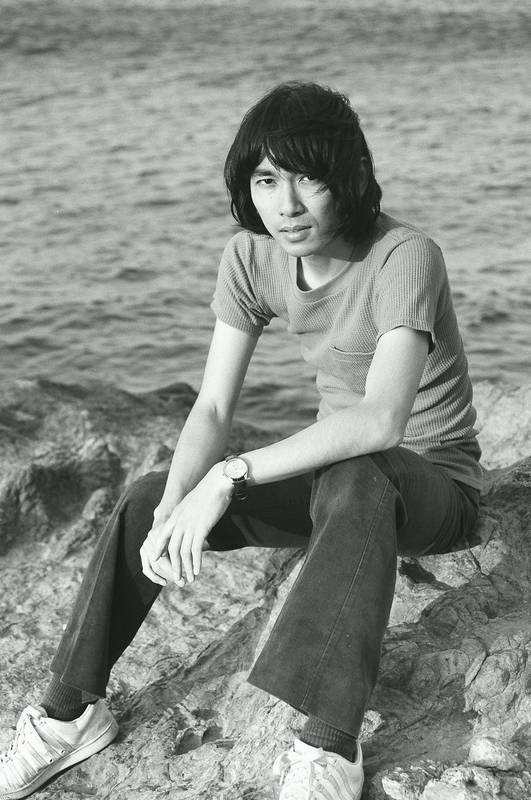
Yusuke Nagai
— You previously wrote on your blog that you wanted your fans to spend their summers listening to “Hachigatsu no Shijou.” Do you have a particular setting or situation you recommend hearing this song in?
Sakakibara: I can’t come up with the perfect situation on the spot. But you know how there’s that strange thing where, just out of the blue, you can suddenly be reminded of a song you were constantly listening to in a summer past and brought back to that time? Well, not that this doesn’t apply to other seasons as well, but summers are so fleeting, aren’t they? They make you feel nostalgic. I think “Hachigatsu no Shijou” is the kind of beautiful song that could become a memory like that for people.
Nagai: Yeah, I don’t have a particular preference as to how or when I want people to listen to it either. Everyone has their own ways of enjoying the summer. Sorry, I wish I had a better answer to your question.
— It’s stupid, but I personally felt like listening to it while lazing around, leaning on my table at home and drinking Calpis. (laughs) But in all seriousness, I think it’s a song that really fits the everyday situations like that — same as with Yuumin’s songs for example.
Nagai: Thank you. This contradicts what I was just saying, but summer is a season with lots of those sorts of symbolic aspects attached to it, so perhaps the song would best be listened to while enjoying those things characteristic of summer.
— Final question: this “summer gift” raises the expectations for your 5th album that’s being released this winter, so could you tell us what sort of an album it’s going to be?
Sakakibara: Like I mentioned earlier, we’ve already recorded 60% or 70% of it. Usually by now we’d be eagerly at work to finish the recordings in one fell swoop, but perhaps because of the EP we started concentrating on in the middle of the process, it feels like Nagai especially might be in need of a reset soon… Honestly, our vision of the album has become a bit blurry. Still, there are lots of songs on there we want everyone to hear, so we’ll do our best to hurry up and get it out there as soon as we can.
Someya: Right. Well, since we picked out all the songs that fit the theme of summer, what we’re now left with is a set of songs that sound like they ought to be released in the winter, so it worked out quite nicely that way. Now we’ll just have to finish it in time. The new album has lots of songs we’ve already been playing live, so I think the material on it will sound more band-like, more “live performance,” and just more influenced by Brazilian music in general.
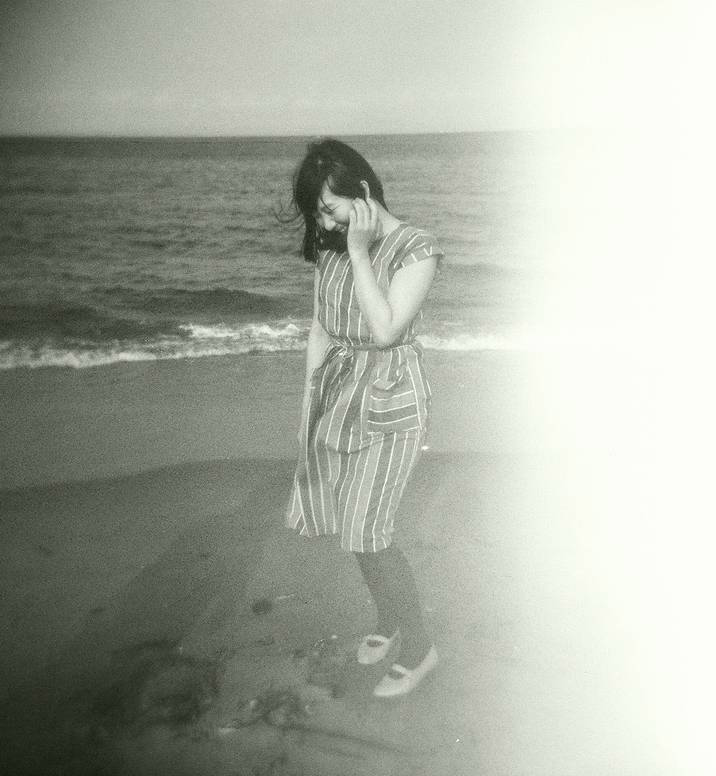
Kaori Sakakibara
Lastly, here’s an interview with OTOTOY.
Original interview & text: JJ (original interview)
English translation: Henkka
Lamp’s Hachigatsu no Shijou, released in August, captivated my ears with its perfect songwriting, arrangements, and the brilliance of its sound production. I must apologize to the fans of Lamp: I really was surprised to learn that such a band even existed within the borders of Japan!
That’s why even though we’re now past its release date, I still want you to hear them out. The songs were carefully composed and arranged by Taiyo Someya and Yusuke Nagai, two songwriters with opposite personalities, and Kaori Sakakibara — who has also been the vocalist of Minuano in recent years — writing the lyrics. Even with just its five songs, their painstaking attention to detail is apparent on this release. Why not try giving a listen to Hachigatsu no Shijou as we wait for their fifth original album? For I must say: Lamp truly is a magnificent band, right up there with the likes of Happy End and Sunny Day Service.
Interview & text: JJ
— What kind of activities is Lamp usually busy with?
 Someya: Pretty much just recording for the most part. We’ve never played live very often, perhaps just two headlining shows a year or so — we almost never share the bill with other bands. Performing live just isn’t very important to us, and all three of us enjoy recording a great deal. We’re in the CD era now, and it feels like when we record something we’re able to capture what we want perfectly, which is something that isn’t always possible in a live setting. Well, maybe it’s a bit different now, but we strongly felt that way at the time of our formation and since then we’ve always just been recording a lot.
Someya: Pretty much just recording for the most part. We’ve never played live very often, perhaps just two headlining shows a year or so — we almost never share the bill with other bands. Performing live just isn’t very important to us, and all three of us enjoy recording a great deal. We’re in the CD era now, and it feels like when we record something we’re able to capture what we want perfectly, which is something that isn’t always possible in a live setting. Well, maybe it’s a bit different now, but we strongly felt that way at the time of our formation and since then we’ve always just been recording a lot.
— Where do you mainly record?
Someya: It varies by album. The first three were recorded in this home studio in a Japanese-style house. After that that we wanted the experience of using a normal recording studio like everyone else, but those proper studios cost a lot of money and your time is limited, and that means we don’t have enough time available to search for the sounds we want. So for the past two albums or so, we’ve just been saving up money ourselves and recording at public facilities and other cheap locations. On this album we worked with recording engineer Shigeki Nakamura who we got to oversee pretty much the entire recording process from beginning to end.
— You mentioned how all three of you enjoy recording. How often do you actually record on average?
Sakakibara: Once or twice a week. We don’t rehearse at all before going in to record, and songs are only finished as we record them — hence the process taking so much time.
Someya: Right. That’s pretty much what we’ve been doing for the past year and a half. We record a week’s worth of ideas, listen back to what we have, take a week to think about what to record on top of that, and go into record again — rinse and repeat. So when we first start working on a song, we don’t at that point know how that song is going to turn out in the end. We only have the basic melodies and chords, and then we just start adding a variety of instruments on top of that. It can be quite a long-winded process, so the engineer, too, has to be very patient, and they have to sort of understand who we are musically in order for us to be able to work with them.
— How long was the recording process for this latest album?
Someya: When we started recording we had about 15 songs and we were planning on releasing all of them on one album, but the fifth song on this release, “Hachigatsu no Shijou,” is about summer, and thus I just suddenly thought it’d be only fitting to release it in the summer, too. This was around May. I talked to the members and the label about it, and we hurriedly set an August release date for it.
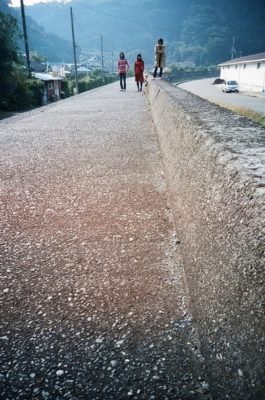 — You have two songwriters in the band. Are you conscious of any major differences between your compositions?
— You have two songwriters in the band. Are you conscious of any major differences between your compositions?
Someya: Longtime listeners of Lamp probably know this, but I think ever since our first album Nagai has consistently written songs that are very “Nagai-like.” They’re songs that only Nagai could’ve written, and I think they’re the only kind of song he could’ve written. Nagai loves the Beach Boys and George Harrison and I think those influences are clearly apparent in his material. He builds his songs from the ground up by gradually adding more and more layers of instruments. For me, I try to think more about the direction of the album as a whole and change the style of my songs accordingly. I’m more of an “author” type.
Sakakibara: Yes, it does feel like Nagai has been writing songs on his terms ever since our first album. He won’t try to please anyone but himself with his songs, and he’s not willing to “force” himself into doing anything. Taiyo is the opposite of Nagai in that he specifically tries to write songs that are out of his comfort zone, and his songs thus feature a wide range of styles.
— To Sakakibara: are the differences in their songwriting something you have to take into consideration when writing lyrics for them?
Sakakibara: Nagai tends to be more of the singer-songwriter type, so he usually writes his own lyrics, too. I mostly write lyrics to Taiyo’s songs. Every once in a while I’ll maybe help Nagai out with a phrase or two, but for the most part I just write for Taiyo’s material.
— What do your lyrics mean to you?
Someya: I hope people don’t take this the wrong way, but for me the music and the melody are always the most important thing over everything else, including the lyrics. That’s not to say that I don’t care about the lyrics at all, but the song always has to come first. So I feel a bit stumped when I’m asked about lyrics… (laughs) I do have opinions when it comes to the aesthetics, like I have certain words I don’t want to use and that kind of thing, but basically I think of music and lyrics as two separate things. But in saying that, I do also recognize that a song only becomes a better piece of music when it has great lyrics to go along with it. Still, for me it’s only when a song is great that you start seeing the importance of its lyrics, too.
— What do you think, Sakakibara?
Sakakibara: I’m different from Taiyo. For me, I feel really let down if I come across a good song that’s ruined by poor lyrics. I don’t think the music alone is everything — it’s the combination of both those things. Good lyrics that fit the melody nicely can really improve a song, but at the same time, I don’t want the lyrics to be too ordinary or too pretentious either, and they need to have something that draws you in. And that really limits what I can write about, so I’ve basically always been writing about similar themes. (laughs)
Someya: Yeah. Ever since we started out you’ve always written lyrics about things you like.
— You mentioned that you don’t like to play live very often. Yet, regardless of that, you still do so on occasion. How come?
Someya: We used to think of playing shows as just a way of sort of saying thanks to the people who buy our CD’s, but lately we’ve actually discovered the fun in playing live as well, so it could be that we’re all a bit more in favor of doing them now. We’re gradually starting to understand the members of our live band when they say they want to play with us again.
Sakakibara: All three of us in the band agree that playing one or two shows a year is just about right. A lot of the time we’re busy recording new material, and getting everyone together for the rehearsals can be a bit problematic. We just don’t have enough time.

— So the fact that you won’t be playing live in the near future means you’ll be using that time to record new material instead?
Someya: When we’re scheduled to play live, that means we have to get together to rehearse around 20 songs or so which takes a lot of time. When we’re recording we want to concentrate solely on that, and our listeners understand this. So yes, we’re going to refrain from playing live as we prepare for our next album.
(At this point, Nagai finally makes a late entrance to the interview…)
Nagai: Sorry…
— (laughs) You’ve released a number of albums in these past 10 years. What do you think has changed since you first started?
Sakakibara: Not all that much, it feels like.
Someya: Yeah, I agree. But at the same time, I’m sure there are some things that have changed unconsciously with our attitudes towards both composing as well as writing lyrics.
Nagai: We don’t really think about changing. We don’t have many musician friends, we play live only very rarely, and we’re constantly recording. That’s how it’s been for us the last 10 years. Sure, I bet there are things that have changed, but if so, we weren’t doing it intentionally. We’re just three people making music we like.
— What would you say is the biggest difference between you and other musicians?
Nagai: I can’t really put this into words well, and I’m not saying this is either a good or a bad thing, but everyone else just seems really professional compared to us. (laughs) Their performance abilities, their staging… everyone seems really professional and talented with all of that stuff. Still, it’s not that I feel inferior to them or anything like that, I just think we’re working towards different directions. Maybe that’s why we can’t make friends with anyone else. (laughs) But I also don’t yearn for us to be like those bands myself.
— Do you have any goals you want to achieve in the future as Lamp?
Nagai: In short, I just want us to become more well-known. Apart from that, I don’t think any of us have anything in particular we feel like we absolutely must do as we aim for that goal.
Sakakibara: Up until now, we’ve been working in a cycle of recording and releasing one CD a year, and I hope we can keep doing that. Somehow we’ve now been around for 10 years, and it feels like if we just keep going, one day someone important might notice and take a liking to us.
Nagai: Honestly, we’re a pretty lousy band as far as having anything in the way of resolve or determination goes. (laughs)
— Did you feel those differences between you and other musicians around you ever since you first started out?
Sakakibara: I did. When we were starting out we thought playing live was something you had to do out of necessity, and so we did. But nothing good ever came of it: no one who saw us live ever told us they’d liked us, and even if they did, we figured they had to have been lying. (laughs) Like, “but we’re crap — how could they possibly like us?” Right now we play with a total of seven people and the members in our live backing band are all fantastic, but in the beginning it was just us — there was no backing band. I’m pretty sure we sounded just dreadful.
Someya: Yeah. I’m certain we were unbearably bad.
— Are you happier with your live performances now?
Sakakibara: After decreasing the number of shows we do, yes.
Nagai: Back then, even having someone from the audience come buy our CD after the show because they’d liked us was completely unheard of. People have only started genuinely complimenting us for our shows in the past two or three years.
— How about on the recording side of things: are you ever truly content with something you’ve recorded?
Someya: We found ourselves getting too sluggish with our recording process, so when we started recording our third album we agreed on a release deadline. But we ended up not being entirely happy with how that album turned out because of it, so we stopped that practice and started working on our fourth album without any sort of deadline again. But whereas our third album had taken us 11 months to record, our fourth took us a year and a half. (laughs) Now with this latest album, I just said I wanted to release it in time for the summer so we all worked hard to make that happen, and the next one we hope to have out in the winter. For the most part we’re a band that records simply by gradually cramming more and more sounds onto our songs — there are hardly ever any subtractions. (laughs) So I’d say that the moment we feel perfectly content with something we’ve recorded is when all three of us agree that there’s nothing more we could possibly add to it. (laughs)
Nagai: Let’s say 100% is the maximum amount of how many sounds you can have on a song. When you get to around 90%, it gets difficult to see the forest from the trees and figure out what else can even be added to the song to improve it, but we keep pushing ourselves regardless, and we simply don’t release the song before we’ve hit 100%. (laughs)
— What is pop music to you?
Someya: When we’re recording, we just take things we think are good and keep carefully adding those things into our songs. The daily accumulation of those ideas is what I’d call our pop music.
Nagai: Exactly as Someya says: it’s an accumulation of all kinds of stuff we think is good. And yet, people will refer to us as just “city pop” or something along those lines. Well, I don’t mind people calling us what they like, but for us it doesn’t feel that way at all. We don’t think of ourselves as “pop,” and the pop we do listen to isn’t the kind of music most people would even associate with that word. I personally haven’t thought of our music as being pop since around our fourth album, I think.
Someya: And then there are other people who just don’t know what to call us.
— Does it feel like you have at this point established a kind of “Lamp sound?”
Someya: Not at all. I don’t feel that way in the least.
Nagai: Right. We’ve never particularly even tried to establish our own “sound” — what we do isn’t anywhere near that far-sighted. It’s just us doing what we like, and that’s it really. But I think it’s this narrow outlook that helps us achieve a level of originality.
— Do all three of you enjoy photography?
Someya: I know especially Nagai does. We have a friend of ours take all our band pictures, but everything else — like the pictures on the fronts and backs of our booklets and such — those are all taken by Nagai on his travels.
— What do you like about it specifically?
Someya: Why don’t you answer this one, Nagai? (laughs)
Nagai: I currently enjoy taking pictures with a film camera; in the past I only owned a digital camera and back then I didn’t have any interest whatsoever in photography. But when I first started using a film camera, I could really sense and understand for myself how the scenery I’m trying to capture is burned onto the film as a pattern of light. That left a deep impression on me, and since then I’m always carrying my camera and some film with me no matter where I go. It’s not that I want to “express” anything with my pictures; I just want to burn the sceneries I come across onto film and make those beautiful patterns of light “mine,” like I was collecting them. Anyway, it’s nothing more than a hobby for me so I don’t think you’re going to get anything very deep on this subject from me. (laughs)
— Is music a hobby for you, too?
Nagai: Hmm, that’s a tough one. We started out as amateurs, and it’s not like anything major that would make us professionals has happened down the line, so I don’t really know. But what I do know is that when we’re creating music, we’re always giving it our utmost best. Well, the utmost best of an amateur anyway. (laughs)
Someya: Right. We’re in constant search of something better when we’re making our music, so I hope our work will continue to reach more and more people.

¹ “Nagai’s Ballad (tentative)” was later given the title of “Tooi Tabiji.”
